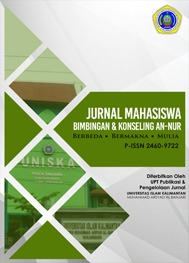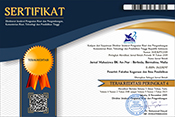PENDEKATAN MINDFULNESS UNTUK MENINGKATKAN PSYCHOLOGICAL WELL-BEING PADA SISWA SEKOLAH DASAR: SEBUAH SYSTEMATIC REVIEW
(1) Universitas Negeri Jakarta
(2) Universitas Negeri Jakarta
(*) Corresponding Author
Sari
Backgrounds: Mindfulness interventions with various methods are currently being widely researched and proven to be effective for increasing psychological well-being for elementary school students. Objectives: The purpose of this article is to systematically review some of the results from the recent study that intervenes in mindfulness techniques to increase psychological well-being in elementary school students. Methods: The studies were carried out in several electronic databases within the past 7 years which were published in English. Conclusion: The study results left 12 journals that met the criteria. Mindfulness intervention for students aged 7-12 years with psychological problems in elementary school students. Mindfulness techniques are effective for reducing emotional dysregulation, increasing social skills, increasing happiness, quality of awareness, increasing concentration, increasing selective attention, improving mental health, increasing self-efficacy. Mindfulness technique training programs can be recommended for implementation in elementary schools and integrated into school curriculum programs.
Kata Kunci
Teks Lengkap:
PDFReferensi
Bakosh, L. S., Snow, R. M., Tobias, J. M., Houlihan, J. L., & Barbosa-Leiker, C. (2016). Maximizing Mindful Learning: Mindful Awareness Intervention Improves Elementary School Students’ Quarterly Grades. Mindfulness, 7(1), 59–67. https://doi.org/10.1007/s12671-015-0387-6
Bernay, R., Graham, E., Devcich, D. A., Rix, G., & Rubie-Davies, C. M. (2016). Pause, breathe, smile: a mixed-methods study of student well-being following participation in an eight-week, locally developed mindfulness program in three New Zealand schools. Advances in School Mental Health Promotion, 9(2), 90–106. https://doi.org/10.1080/1754730X.2016.1154474
Crescentini, C., Capurso, V., Furlan, S., & Fabbro, F. (2016). Mindfulness-oriented meditation for primary school children: Effects on attention and psychological well-being. Frontiers in Psychology, 7(JUN), 1–12. https://doi.org/10.3389/fpsyg.2016.00805
Devcich, D. A., Rix, G., Bernay, R., & Graham, E. (2017). Effectiveness of a Mindfulness-Based Program on School Children’s Self-Reported Well-Being: A Pilot Study Comparing Effects With An Emotional Literacy Program. Journal of Applied School Psychology, 33(4), 309–330. https://doi.org/10.1080/15377903.2017.1316333
Graham, A., & Truscott, J. (2020). Meditation in the classroom: supporting both student and teacher wellbeing? In Education 3-13 (Vol. 48, Issue 7). https://doi.org/10.1080/03004279.2019.1659385
Hai, A. H., Franklin, C., Cole, A. H., Panisch, L. S., Yan, Y., & Jones, K. (2021). Impact of MindUP on elementary school students’ classroom behaviors: A single-case design pilot study. Children and Youth Services Review, 125(February), 105981. https://doi.org/10.1016/j.childyouth.2021.105981
Malboeuf-Hurtubise, C., Taylor, G., & Mageau, G. A. (2019). Impact of a Mindfulness-Based Intervention on Basic Psychological Need Satisfaction and Internalized Symptoms in Elementary School Students With Severe Learning Disabilities: Results From a Randomized Cluster Trial. Frontiers in Psychology, 10(December), 1–9. https://doi.org/10.3389/fpsyg.2019.02715
Nurgiyantoro. (2002). No 主観的健康感を中心とした在宅高齢者における 健康関連指標に関する共分散構造分析Title. 59(2), 1–11.
Poormirzaei, M., Bagheri, M., Askarizadeh, G., Sciences, H., Sciences, H., Five, B., & Sciences, H. (2022). Introduction. 9(2).
Portele, C., & Jansen, P. (2023). The Effects of a Mindfulness-Based Training in an Elementary School in Germany. Mindfulness, 0123456789. https://doi.org/10.1007/s12671-023-02084-w
Sanders, W., Zeman, J., Poon, J., & Miller, R. (2015). Child Regulation of Negative Emotions and Depressive Symptoms: The Moderating Role of Parental Emotion Socialization. Journal of Child and Family Studies, 24(2), 402–415. https://doi.org/10.1007/s10826-013-9850-y
Thomas, G., & Atkinson, C. (2016). Measuring the effectiveness of a mindfulness-based intervention for children’s attentional functioning. Educational and Child Psychology, 33(1), 51–64. https://doi.org/10.53841/bpsecp.2016.33.1.51
Vickery, C. E., & Dorjee, D. (2016). Mindfulness training in primary schools decreases negative affect and increases meta-cognition in children. Frontiers in Psychology, 6(JAN), 1–13. https://doi.org/10.3389/fpsyg.2015.02025
Wen, X., Zhang, Q., Liu, X., Du, J., & Xu, W. (2021). Momentary and longitudinal relationships of mindfulness to stress and anxiety among Chinese elementary school students: mediations of cognitive flexibility, self-awareness, and social environment. Journal of Affective Disorders, 293(19), 197–204. https://doi.org/10.1016/j.jad.2021.06.038
Zhu, X., Tian, L., Zhou, J., & Huebner, E. S. (2019). The developmental trajectory of behavioral school engagement and its reciprocal relations with subjective well-being in school among Chinese elementary school students. Children and Youth Services Review, 99(September 2018), 286–295. https://doi.org/10.1016/j.childyouth.2019.01.024
DOI: http://dx.doi.org/10.31602/jmbkan.v9i2.11471
Refbacks
- Saat ini tidak ada refbacks.
Akun Akademik Anda Terhubung dengan :
Didedikasikan Untuk:
Jurnal Mahasiswa BK An-Nur : Berbeda, Bermakna, Mulia disseminated below Lisensi Creative Commons Atribusi 4.0 Internasional.
















